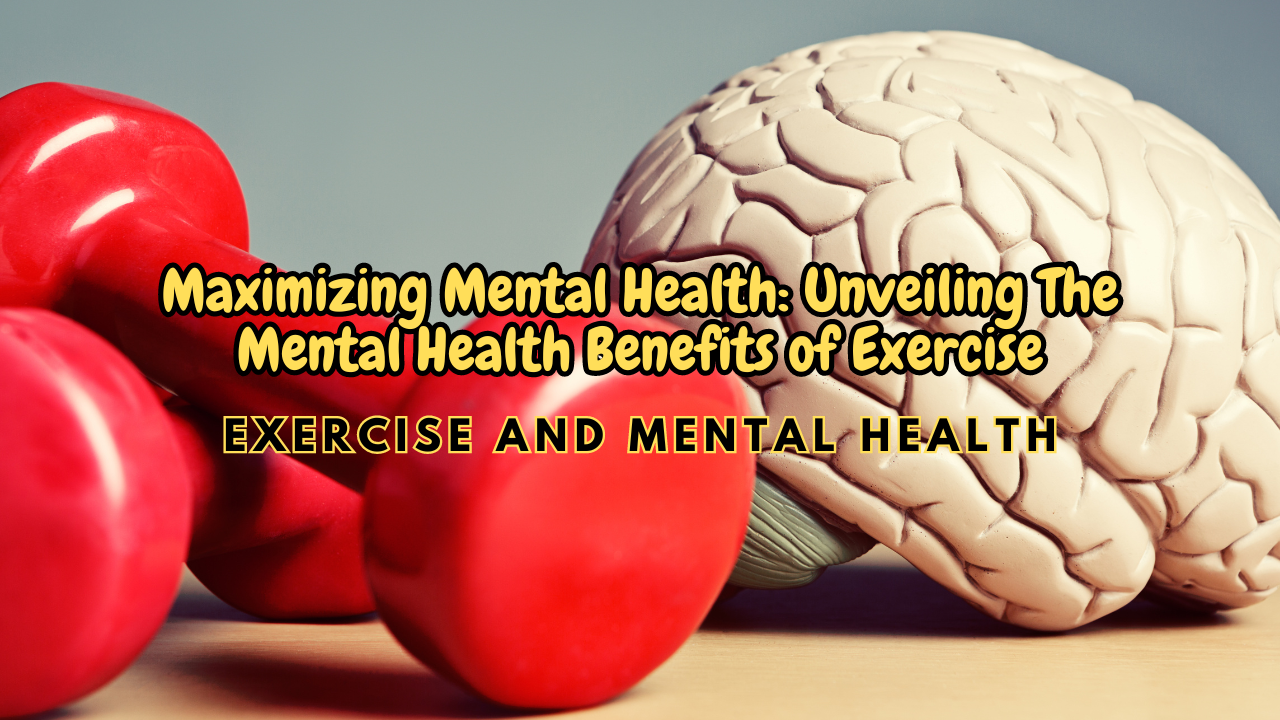A profound yet unappreciated aspect of exercise is the tremendous impact it has on mental health. In the bustling world of fitness, where chiseled bodies and physical prowess are frequently the focus of attention, there is a significant yet underestimated reality. There is a treasure mine of cognitive, emotional, and psychological benefits that can be unlocked via regular physical activity. These benefits lead to a healthier and happier mind, in addition to the obvious bodily changes that occur. Department of health research ensure that exercise can improve your over all better mental health and physical health conditions.
Exercise can help for both physical and mental well-being. Engaging in physical activity has been linked to improved physical health and mental wellness. According to the Department of Health's physical activity guidelines, incorporating regular exercise into one's routine is essential for maintaining overall health. Notably, exercise may play a pivotal role in alleviating symptoms of depression and anxiety. Scientific studies have consistently shown that individuals who exercise regularly experience a reduction in feelings of anxiety and depression, contributing to an enhanced quality of life. The positive impact of exercise on mental health is attributed to various factors, including the release of endorphins, improvement in sleep patterns, and the cultivation of a sense of accomplishment. By recognizing the interconnectedness of physical and mental health, it becomes evident that integrating regular exercise into daily life can significantly contribute to a healthier and more fulfilling lifestyle.
Neurotransmitters and The Benefits of Exercise
There is a molecular symphony that takes place in our brains whenever we go to the gym or go for a jog. Endorphins, typically referred to as the body's natural "feel-good" chemicals, are released into the bloodstream as a result of physical activity. These neurotransmitters have the ability to elevate one's mood by, among other things, lowering the sensation of pain and bringing about feelings of euphoria. The well-known so-called "runner's high" is not only a fiction; rather, it is a concrete example of the beneficial effect that physical activity has on the chemical composition of our brains.
Brain-Derived Neurotrophic Factor (BDNF) and Cognitive Enhancement
The Brain-Derived Neurotrophic Factor (BDNF) is the star of the show when it comes to the neuronal fireworks that exercise brings about. Brain-derived neurotrophic factor (BDNF) is a protein that helps neurons develop, maintain themselves, and survive. The ability of the brain to adapt and develop new neural connections is referred to as neuroplasticity. Regular physical exercise has been related to increased levels of BDNF, which have been shown to support neuroplasticity. There is a correlation between this neurotrophic miracle and enhanced cognitive function, learning, and remembered information.
Stress, Depression And Anxiety Reduction and Cortisol Regulation
As a result of the fast-paced lifestyle that is prevalent in today's society, stress is an ever-present threat to mental health. Within the context of the fight against stress, however, physical activity appears as a powerful ally. The release of cortisol, the stress hormone that the body produces, is prompted by physical exercise, which helps to manage the levels of this hormone. There is a correlation between the controlled ebb and flow of cortisol and stress resilience. This correlation ensures that the mind is ready to manage the problems that life puts in front of it with more ease.
Mental Health Benefits of Exercise: Hippocampal Neurogenesis and Memory Enhancement
The hippocampus, which is shaped like a seahorse and is located in the brain, plays an important role in both learning and memory. It has been discovered that physical activity can increase hippocampus neurogenesis, which is the process of creating new neurons in this region. Furthermore, this phenomenon is not only beneficial for the strengthening of memory, but it is also associated with the management of mood, which further solidifies the mutually beneficial relationship that exists between physical activity and mental health.
Started with Exercise to Improve Serotonin, Norepinephrine, and Mood Regulation
Serotonin and norepinephrine are two neurochemicals that come into play as we go deeper into the neurochemical ballet that fitness exercises cause. There is a significant function that these neurotransmitters play in the regulation of mood. Regular physical exercise has been linked to elevated serotonin levels, which in turn confers a natural antidepressant effect on the participating individual. At the same time, the neurotransmitter norepinephrine, which is associated with alertness and attention, experiences an increase, which contributes to improved concentration and mental clarity.
Regular Exercise Routine Improve Sleep Quality and the Circadian Rhythm
A relationship that is worth investigating is the delicate dance that takes place between physical exercise and the quality of sleep. Participating in regular physical activity helps to regulate the circadian rhythm, which in turn promotes a healthy relationship between sleep and wakefulness. Furthermore, cognitive performance, emotional well-being, and overall mental health are all significantly impacted by the quality of sleep that one gets. When combined, the effects of physical activity and rest create a synergistic effect that results in a full mental regeneration.
Do Much Exercise for Social Connection and the Fitness Community
The social part of physical exercise emerges as a crucial contributor to mental well-being, which is different from the biochemical aspect of physical exercise. It is possible to cultivate social relationships by participating in a fitness class, joining a sports team, or simply having a workout partner. Human beings are fundamentally social creatures, and the sense of community that may be gained via participation in shared physical activity or exercise can serve as a source of emotional support, inspiration, and a defensive mechanism against feelings of loneliness.
Mind-Body Harmony and Mindfulness for Better Physical Health
"Mind-body connection" is not merely a cliche; rather, it is a fundamental truth that exists out there. Practicing mindfulness, which is the act of paying attention to the here and now, is facilitated by engaging in physical activity. Whether it's the pulsating flow of yoga or the intense concentration of weightlifting, exercise promotes a heightened awareness of the body and breath, which in turn helps to nurture mental clarity and reduce stress.
FAQ's
What are the benefits of exercise for mental health?
Exercise on a regular basis has been demonstrated to release endorphins, which are natural mood enhancers and neurotransmitters. Furthermore, exercise lowers stress hormones, enhances sleep quality, and gives a person a sense of achievement—all of which contribute to greater mental health.
Is it possible to overcome anxiety and despair with exercise?
Yes, a number of studies back up the claim that engaging in regular physical activity can help manage and overcome anxiety and depression symptoms. Exercise not only provides a healthy way to let go of unpleasant emotions but also lessens the physiological impacts of stress.
Which kinds of physical activity are best for mental health?
Strength training and cardiovascular activity, like swimming, cycling, or running, have both been proven to improve mental health. Selecting enjoyable activities is crucial, as it enhances the probability of sticking to a consistent workout schedule.
What is the suggested amount of exercise for mental health benefits?
TAdults should strive for at least 150 minutes of moderate-intensity aerobic exercise or 75 minutes of vigorous-intensity exercise per week, in addition to muscle-strengthening exercises on two or more days of the week, as per the recommendations for physical activity issued by health organizations.
Does exercise provide short-term or long-term benefits for mental health?
A single exercise session may provide some people with an instant mood boost, but regular physical activity has longer-lasting effects on mental health. Exercise can make a significant and long-lasting difference in your mental health, but consistency is the key.
Conclusion
The impact that physical exercise has on mental health is a brilliant hue that is frequently undervalued and overshadowed in the kaleidoscope of advantages that have been attributed to physical exercise. In addition to the chiseled physiques and cardiovascular health, there is a domain where neurotransmitters, neurotrophic factors, and social relationships come together to create a tapestry of holistic well-being. Whether we are lacing up our sneakers or stepping onto the yoga mat, let us remember that each stride and stretch is not only a physical activity but also a transforming journey for the mind. This journey is a trek toward a mental landscape that is brighter, more resilient, and more joyful.





